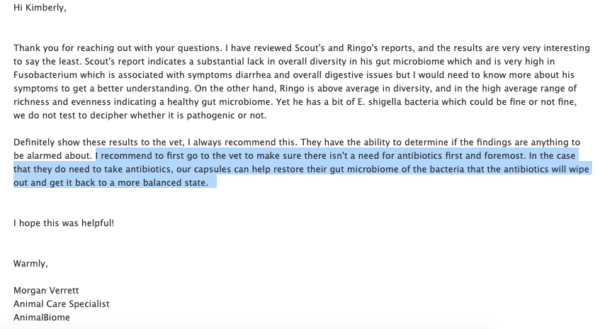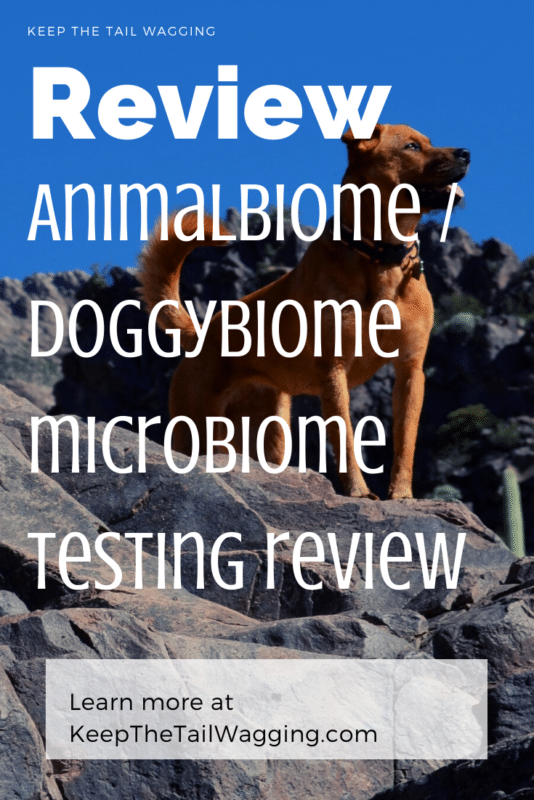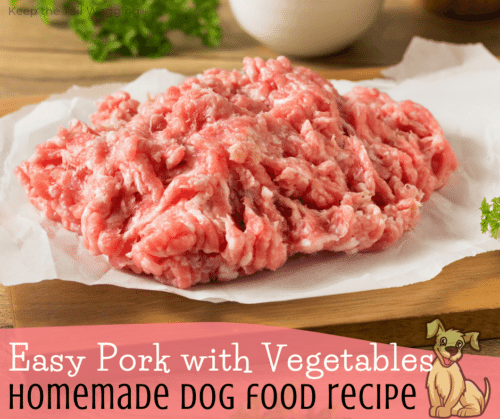Keep the Tail Wagging is supported by pet parents. I occasionally earn a commission (at no additional cost to you) when you click through an affiliate link to one of my favorite products. Thank you for your support. Read More
This review of the AnimalBiome Doggy Biome microbiome testing kit was originally published in April 2019. A friend introduced me to AnimalBiome and I ordered two kits (BOGO Deal) and tested two of our dogs.
What Is AnimalBiome?
AnimalBiome (aka DoggyBiome) is a company that tests the gut biome of our pets through a stool sample that we send to them to let us know the state of the gut microbiome (healthy or unbalanced).
I ordered the kits (nope, I didn't receive anything for free), and they arrived promptly with clear instructions on collecting a stool sample. AnimalBiome even provides gloves and other tools so that we don’t have to handle the poop with our bare hands. I took the dogs outside, walked around with them, collected their poop with poop bags, and set everything up outside to collect stool samples.
Johan was completely grossed out. I told him that at least I wasn’t doing it at the kitchen counter. Although I pretended that this was my plan just to get the reaction. Priceless.
Another step in the process is setting up an account for each tested dog. A few weeks later, I received an email that the results were available, and I could log onto their account to review a summary and print a full report.
Why I Care About My Dogs’ Gut Microbiome
Rodrigo is the reason I’m obsessed with my dogs’ gut microbiome. He has a history of digestive issues, including gas, loose stool, and environmental allergies. If he wasn’t already a raw fed dog, I’m certain people would recommend switching him over.
Transitioning to raw did solve many of his health issues, but many still lingered, and they could all be tied directly to the gut. Managing his health was overwhelming as I spent years testing out proteins and supplements to see what worked best for him.
I was excited about AnimalBiome because I thought testing his microbiome might give me some insight into his health and provide me with a few solutions.
My Dogs' Microbiome Test Results
When I received the test results, I immediately printed the full report and sat down for a read. I expected to read a report similar to the dog DNA tests or the sensitivity test. I was wrong. They gave me a list of the bacterium floating around my dog’s gut, including how much (and how little).
The report also compared my dogs' microbiome results to other dogs. However, I don't believe this is an “apples to apples” comparison. In other words, the reports don't compare raw fed dogs to other raw fed dogs.
I'll admit that the report was interesting, but I didn't know what to do with the information. I was left with more questions because I'd never been exposed to this information. It seemed like Rodrigo finally had a healthy gut after so much work. Am I reading that right? If so, why is his gut healthy? What did I do right?
I quickly opened Scout’s test results expecting him to score higher; I was wrong. Scout’s test results were awful. What? They read as a dog that has chronic digestive issues. Scout only has loose stool or diarrhea occasionally; he’s very healthy. I was more confused.
My Consultation with AnimalBiome
I made a mistake assuming I would be contacted to schedule a consultation to review the test results. This is what happened with the nutritional blueprint test and allergy test. I should have contacted AnimalBiome directly with my questions. I learned later that AnimalBiome did reach out to me about a consultation, but the email either landed in my spam folder or got held up on the Interwebs – I never received it.
My Email to AnimalBiome…
“I had my dogs' poop tested back in January (I believe) and received the results. I planned to do a review, but none of it meant a thing to me. Are my dogs healthy, not healthy, is there something that I can do to help them other than buying your supplements?
Of course, I respect that you're a business and one aspect of that business is supplementation, but I was wondering if the biome test is something that I should take to my vet for review or if you offer a service that better explains the results.”
Response from AnimalBiome
“Thank you for reaching out with your questions. I have reviewed Scout's and Ringo's reports, and the results are very very interesting to say the least. Scout's report indicates a substantial lack in overall diversity in his gut microbiome which and is very high in Fusobacterium which is associated with symptoms diarrhea and overall digestive issues but I would need to know more about his symptoms to get a better understanding. On the other hand, Ringo is above average in diversity, and in the high average range of richness and evenness indicating a healthy gut microbiome. Yet he has a bit of E. shigella bacteria which could be fine or not fine, we do not test to decipher whether it is pathogenic or not.
Definitely show these results to the vet, I always recommend this. They have the ability to determine if the findings are anything to be alarmed about. I recommend to first go to the vet to make sure there isn't a need for antibiotics first and foremost. In the case that they do need to take antibiotics, our capsules can help restore their gut microbiome of the bacteria that the antibiotics will wipe out and get it back to a more balanced state.
I hope this was helpful!”
Is Antibiotics the Answer to Gut Issues?
To be honest, I don't know. I'm not a veterinarian. I'm sure there might be some infections in the gut that are best treated with antibiotics. But the response left me even more confused. The last word I expected to read when reviewing a gut microbiome report was “antibiotics.”
It wasn't clear which dog she suspected needed antibiotics, and she didn't explain what made her think antibiotics might be necessary.
I received the following clarification from a representative of AnimalBiome on July 5, 2019:
“I apologize if some of the information around antibiotics was not communicated clearly by my team. But to be clear, AnimalBiome has never, and will never, recommend a cat or dog go on antibiotics based on the results of our microbiome test. We appreciate honest reviews, but we feel that the component of the review pertaining to our recommendation of antibiotics misrepresents our core mission and values.”
To show that I didn't “misrepresent” their words, here is a screenshot of the initial email that I received from the company:
My Dogs' AnimalBiome Test Results
The following was taken, word for word, from the reports I received from AnimalBiome for Rodrigo and Scout. I attempted to add screenshots. However, the words were too small to read.
Fusobacterium
- Rodrigo: 37.28
- Scout: 49.58
- Average for Healthy Dogs: 19.8
Bacteria belonging to the Fusobacterium genus help your pet digest animal proteins. If your pet lacks Fusobacterium, increasing the protein content in their diet will likely be helpful. At the same time, elevated levels of Fusobacterium are associated with diarrhea and chronic digestive issues, so moderation is key. For correcting overabundances of Fusobacterium, consider adding more dietary fiber to your pet's diet.
Prevotella
- Rodrigo: 4.11
- Scout: 0
- Average for Healthy Dogs: 15.9
Bacteria belonging to the Prevotella genus help digest carbohydrates in your pet's diet. They are present in moderate amounts in most healthy pets, but when they become too abundant, they are associated with unhealthy levels of inflammation. Prevotella may even play a role in chronic conditions like Inflammatory Bowel Disease (IBD). If your pet has too much Prevotella, consider decreasing or eliminating simple carbohydrates from their diet. This includes grains, starches, fruits, and vegetables.
Bacteroides
- Rodrigo: 10.45
- Scout: 29.49
- Average for Healthy Dogs: 12.2
Bacteria belonging to the Bacteroides genus help prevent harmful bacteria from colonizing in the gut. Pets with more of these bacteria tend to have healthier body weights. If your pet's sample is low in Bacteroides, consider adding a prebiotic supplement like psyllium husk powder, inulin, or acacia gum to help feed these bacteria.
Megamonas
- Rodrigo: 0
- Scout: 0
- Average for Healthy Dogs: 11.5
Bacteria belonging to the Megamonas genus help regulate your pet's metabolism. Megamonas bacteria kick into high gear if your pet stops eating or is unable to absorb nutrients from their food; in these cases, the Megamonas bacteria help preserve energy so your pet does not lose weight. When too much Megamonas bacteria is present, however, it can make your pet more prone to becoming overweight.
Blautia
- Rodrigo: 1.77
- Scout: 3.9
- Average for Healthy Dogs: 5.5
Bacteria belonging to the Blautia genus produce anti-inflammatory compounds that help protect the digestive tract from becoming damaged due to chronic inflammation.
Peptoclostridium
- Rodrigo: 1.24
- Scout: 3.81
- Average for Healthy Dogs: 4.4
Bacteria belonging to the Peptoclostridium genus help protect your pet against a number of intestinal pathogens, including Clostridium difficile and certain harmful strains of Escherichia coli. Pets with healthy levels of Peptoclostridium tend to have healthier immune and digestive systems. These bacteria may be deficient in overweight or obese pets.
Collinsella
- Rodrigo: 10.34
- Scout: 1.7
- Average for Healthy Dogs: 3.5
Bacteria belonging to the Collinsella genus help detoxify poisons and protect the gut against pathogens. While Collinsella are helpful in moderate amounts, an overgrowth can be problematic: elevated levels of Collinsella have been associated with diarrhea and Inflammatory Bowel Disease (IBD). Increasing fiber consumption may help to keep Collinsella levels in check.
Sutterella
- Rodrigo: 2.57
- Scout: 2.08
- Average for Healthy Dogs: 3.5
Bacteria belonging to the Sutterella genus help keep the immune system active, counteracting other types of bacteria that suppress the immune system. Moderate levels keep your pet safe from illness; at the same time, higher levels are associated with digestive issues like diarrhea and food sensitivities.
Faecalibacterium
- Rodrigo: 1.27
- Scout: 0
- Average for Healthy Dogs: 2.7
Bacteria belonging to the Faecalibacterium genus are more abundant in active animals at healthy weights. These bacteria also help combat inflammation in the body. Animals with Inflammatory Bowel Disease (IBD) and other chronic inflammatory conditions tend to have low levels of Faecalibacterium.
[Ruminococcus] gnavus group
- Rodrigo: 0
- Scout: 0.33
- Average for Healthy Dogs: 2.5
Bacteria belonging to the [Ruminococcus] genus possess potent anti-inflammatory properties and also help kill pathogens that have entered the digestive tract. To increase [Ruminococcus] levels, try adding a source of dietary fiber like psyllium husk, inulin, or acacia gum to your pet's diet.
Clostridium
- Rodrigo: 1.05
- Scout: 0.35
- Average for Healthy Dogs: 2.2
Bacteria belonging to the Clostridium genus have been linked with high-protein, low-carbohydrate diets, which are recommended for healthy weight loss. They also tend to be more abundant in pets that are on raw diets. But too much Clostridium can be problematic; to reduce Clostridium levels, consider adding S boulardii, a yeast-based probiotic, to your pet's regimen. This strain of yeast helps decrease the amount of Clostridium bacteria in the gut.
Escherichia Shigella
- Rodrigo: 11.38
- Scout: 1.75
- Average for Healthy Dogs: 1.4
Bacteria belonging to the Escherichia genus are normally present at low levels in many healthy pets. However, excessive levels of particular strains have been linked with chronic diarrhea and other health issues.
Lachnospiracaea
- Rodrigo: 0.24
- Scout: 0.82
- Average for Healthy Dogs: 1.3
Bacteria belonging to the Lachnospiraceae family possess potent anti-inflammatory properties and also help kill pathogens that have entered the digestive tract. To increase Lachnospiraceae levels, try adding a source of dietary fiber like psyllium husk, inulin, or acacia gum to your pet's diet.
Lachnoclostridium
- Rodrigo: 1.03
- Scout: 1.43
- Average for Healthy Dogs: 0.8
Bacteria belonging to the Lachnoclostridium genus possess potent anti-inflammatory properties and also help kill pathogens that have entered the digestive tract. To increase Lachnoclostridium levels, try adding a source of dietary fiber like psyllium husk, inulin, or acacia gum to your pet's diet.
Final Thoughts on AnimalBiome
After I sat down and really read the reports, I was able to gain a better understanding of the results and my initial takeaway is that my dogs need more fiber in their diet.
Sources of Fiber:
- fur (they eat rabbit feet and ears with hair)
- vegetable
All in all, I think that this is an important test but I don't think the information provided in the report was easy to understand and I would have appreciated an opportunity to review these results with a professional.
I Still Have Questions About AnimalBiome
When I was talking about the test with my boyfriend, someone who knows less than I do about dog nutrition and health, he had the following questions that I found compelling:
- What dogs are our dogs being compared to? How many dogs do they have in their database? – I'm certain AnimalBiome has this information on their website, but I was stumped. I don't know.
- Our dogs are fed raw; are they being compared to other raw fed dogs or kibble fed dogs? If AnimalBiome has kibble fed dogs in their database, is it a fair and accurate comparison? Are there enough raw fed dogs being tested to be able to offer an apples-to-apples comparison?
- What about the age and breed of the dogs in their database? Or where the dogs live? Does that impact the microbiome? And if our dogs are being compared to them, are the results accurate?
- Do the test results foresee any health issues? Later in 2019, Rodrigo was diagnosed with exocrine pancreatic insufficiency.
Speaking to J made me realize how much I don't know about the microbiome, and while this is interesting information, we are at the start of this groundbreaking path to understanding our dogs' health. When I tested my dogs, there were too many unknowns. However, as AnimalBiome (and its database) grows, I believe the information will become more accurate and valuable. Dog DNA tests come to mind; over the years, the tests have become more accurate as their breed/breed-mix database has grown.
My Disappointment with AnimalBiome
My only disappointments were the reports, which I found confusing and overwhelming, and the email exchanges with AnimalBiome. I felt dismissed. As if my experience didn't matter.
Update on AnimalBiome Review
Although I had less than a stellar experience with AnimalBiome in 2019, I hear from more people who have had positive experiences. Check out AnimalBiome reviews, and you'll see that they're mostly positive, with the main critique being that the supplements didn't work for their dog or cat. To me, that's to be expected; not everything works for every pet.
AnimalBiome now regularly offers consultations to go over their tests with customers. I've heard from several customers that they were able to get more information about the test as well as guidance on the next steps to help their dog. AnimalBiome also has a YouTube channel that offers more information on their tests.
After my experience, I didn't plan to invest in microbiome testing again because it's a waste of money if I can't understand the test results. I changed my mind in 2022 when a local holistic veterinarian recommended the test for Scout. She believes in treating the underlying cause of cancer and wanted to start with the gut.
If you're interested in testing your dog's microbiome, order your AnimalBiome Microbiome testing kit today!


















